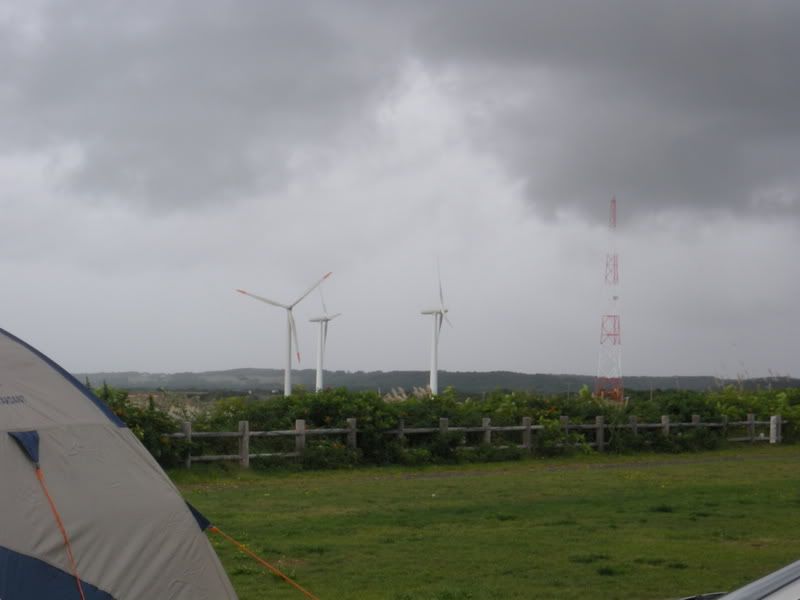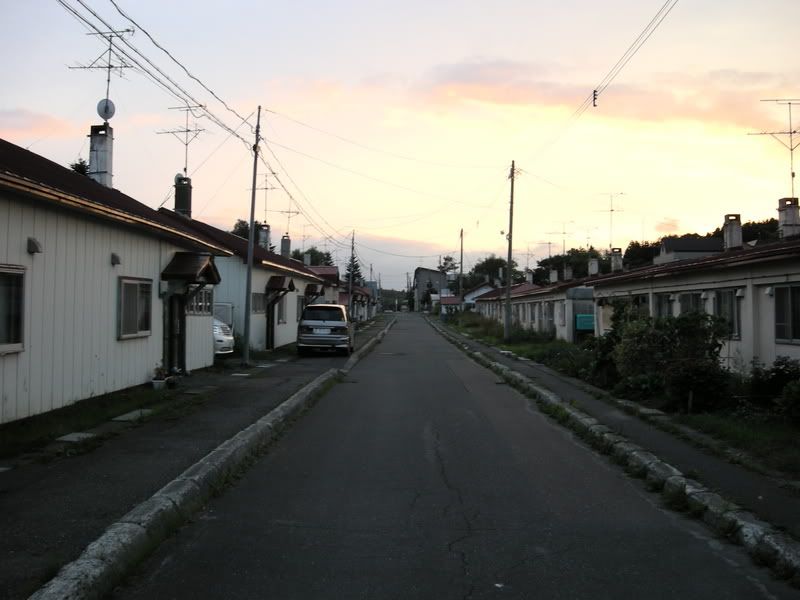Typhoons, Tomamae and Travelling in Japan
After a busy week jumping between school, town hall and soccer field the weekend camp in Tomamae (a tiny North-Western town) for all the JET folks in Northern Hokkaido sounded like a great idea. A chance to say things like ‘incomprehensible’ and be understood, a rare occurrence in Japan; Beer and beach and sunshine. But that was before the typhoon…
…Friday morning arrives and I’m greeted with images of tiny Japanese news reporters holding onto street poles for their lives as a category 2 typhoon wends its way through Honshu, just south of Hokkaido and the precious campsite. Come the afternoon and the weather in Sarufutsu had taken a definite turn for the worse. Gale force winds, torrential rain and all the other things one associates with the end of the world. After some furious chain emailing amongst my neighbouring JET residents, I was able to dampen the delightfully hazardous enthusiasm that was expressed amongst certain individuals to make the 3 hour drive in such a maelstrom, pitch a tent in the pitch black of night whilst fighting off wind and rain and wild bears. By ‘individuals’, of course, I mean Heather and Moraya; Super-keen Wakkanai JETs, unafraid of being thrown off a country road by gale force winds into the sharp and fatal hooves of a nearby dairy cow. I love being miserable, cold and wet as much as the next person, but my idea of fun includes a roaring fire and a beer in hand, not watching cows being flung about like leaves in gale force winds, becoming giant bovine missiles of udder-death. It can happen…

On the road to Tomamae.
Thus it was on a Saturday morning that we set out for Tomamae. Driving in the hills and countryside is an utterly sublime experience, to say the least. Mist-enshrouded hills and mountains, wide open crops and pastures for the many dairy farms that dot the landscape of Hokkaido, all do well to impress upon oneself the true beauty that this place holds. Now I realize there are plenty of cows, mielies and hills in
Likewise, upon arrival on Saturday afternoon there were exactly two people who had arrived for the camp so we had not lost out on any special moment or somesuch. Clearly the typhoon had done well to ward off any eager beavers wanting to head out on Friday. More people arrived, mostly Americans and a smattering of Canadians, and tents were pitched. What was probably the most surprising aspect of it all was how fragmented everyone was. I don’t think it’s an exaggeration to claim that us northern-most ALT folks are about the most tightly-knit of the new JETs in our region. It’s nice to be arrogant, but it’s even nicer to be arrogant and right! Thus Saturday saw me sitting in a circle with a decidedly (and I would say deservedly) pompous air, beer in hand, trying to decipher what accent was American and what was Canadian. As a plus it turned out that the Typhoon had veered sharply eastwards, removing the last of my doubts and fears of typhoon-powered dairy cows impaling me at mach 2.

The sun making a long-overdue appearance after the giant typhoon of doom flies away.

Giant energy-producing windmills, doing their thing. These things are everywhere in Hokkaido. For a country that still harpoons whales and consumes about a rainforest a day in disposable chopsticks, they sure are energy-friendly!

The campsite. It’s as surreal as it looks.
In all the camp was great, and new friends were made, mostly due to us commonwealth folks sticking out like Boers laagered in the open veld, keeping a stout heart and making snide xenophobic insults at anything that doesn’t play rugby, as well as what was quite possibly the funniest beer run in history. Thankfully the one Brit at the camp didn’t come along and was spared being reduced to tears by our unceasing anti-Anglophile assault. With a true-blooded South Irish girl, a South African (me!) and two Kiwis, the tolerance for colonial bally-hoo-esque antics was low and any transgression brutally shot down, but in a funny, drunken kind of way, of course. I have to wonder how long we shall remain pals, however, as the World Cup has now started and I must for the sake of the boks become mortal enemies with any and all New Zealanders running around this island. Such is the way things are. I don’t make the rules about these things, I just follow them!

Americans and Canucks. Largely unremarkable except for a precious few.

Heather. From Tennessee… Definitely not unremarkable!

Irish Anne, Kiwi #1 and Kiwi #2, 15% of Theresa’s head and some other nameless bloke. The funniest people to go to the store with!
Of course, just because we’re foreigners doesn’t mean we’re friends, and there were plenty of folks at the camp I had neither met nor wished I ever had. It’s slightly disturbing to see folks so committed to being ardent retards, but kind of endearing as well. I guess it’s like the kid in your class who drools a bit. You just have to smile and pat him/her on their hunchback. Of course, my initial pomposity after such a glorious trek from Sarufutsu unnerved many I’m certain, and those who know me will also know how hilarious I find that. Correct use of feigned arrogance does wonders to ward off slack-jawed loud-mouths from far-flung corners of the earth. It does not, however, prevent the bastards from stealing your chair and beer. That’s right folks, Americans steal your beer! If you want one, ask and I will gladly provide, but simply yoinking an icy beverage from my hoard will earn you scorn and eternal shame in the books of John (for the religious I mean MY books, not that other guy who wrote about Jesus.) I have no idea in what part of the world such open thievery is tolerated, but in the People’s Republic of John beer-thieves are drawn and quartered. Mr. beer-thief, if you’re reading this, I will stab you in your spleen. Repeatedly. With a spoon. From a post-camp inventory we still ended up with a lot of excess food and drink, but the principle remains true! Just because there’s lots doesn’t mean it’s there for the taking. Revenge shall be had, I am certain of that. The northern-most JET’s shall strike back when everyone least expects it. So don’t be surprised come Christmas day when your turkey disappears, or there are no presents. It’s not the grinch, it’s karma hitting back!
After seeing the unending compassion and humility displayed by the locals in my town, the brief 24 hours spent with true westerners was more of a shock than I had anticipated, and would have dampened my spirits as easily as any typhoon had there not also been some very incredible people attending as well. And at the very worst, watching a giant night sky on the grass, replete with shooting stars and bonfire, made up for all the little minor inconveniences and still left change to spare!
Basically then, the weekend can be summed as follows:
l Typhoons mean STAY IN BED! Flying moo-cows are a real and ever-present danger.
l If you think it’s the right turnoff, it probably isn’t.
l The British have the funniest accents in the world. From cockney to Windsor Lordling, they’re all hilarious.
l Stealing my beer means I will steal your first-born and sell him/her to Somali pirates.
l Americans are loud.
l The Irish have a disturbingly strong affiliation with the IRA even today…



